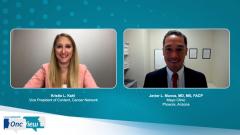
Factors in Choosing Relapsed/Refractory Follicular Lymphoma Treatments
A specialist explains the factors considered when it comes to choosing treatments for patients with relapsed/refractory follicular lymphoma, and the clinical endpoints to look for.
Kristie L. Kahl: What factors do you consider when choosing treatment for the first relapse in relapsed or refractory follicular lymphoma?
Javier L. Munoz, MD, MS, FACP: It is very important to bring all variables to the table, and these can be disease-specific or patient-specific; for example, the disease tempo. Was there POD24, or progression of disease within 2 years from first-line therapy? Has there been evidence of histologic transformation, whether it is suspected or confirmed transformation? What was the first-line therapy previously used? You would not want to retreat with the same therapy or a regimen that is too similar to the first-line therapy that has already failed. Regarding patient-specific factors, you need to consider the patient’s age, fitness or performance status, and other medical problems or comorbidities that may have an impact when it comes to your choice of therapy. It is not an easy decision to make, and treatment paradigms are always changing in this disease. How does treatment choice after first relapse affect my treatment options in later lines? We do not only look at 1 variable, but many. Based on the results of the AUGMENT trial, a phase 3 trial that looked at lenalidomide plus rituximab versus placebo plus rituximab in relapsed or refractory indolent lymphoma, many are prescribing lenalidomide plus rituximab in the second line, let’s say in a patient who had previously received chemotherapy plus rituximab front line. But again, it would be oversimplistic for me to sign a blank check recommendation for 1 particular therapy in the second line for all patients. We look at all variables, both disease-specific and patient-specific, before making a therapeutic decision. We always welcome second opinions, and we learn from our colleagues from doing so. We always encourage patients to seek those second opinions, particularly when they’re considering enrolling in clinical trials.
Kristie L. Kahl: What clinical end points are most meaningful to you? For example, progression-free survival or tumor reduction?
Javier L. Munoz, MD, MS, FACP: I always want to offer my patients a chance to live longer, which means that I am always looking to choose therapies that provide proven improvements when it comes to overall survival. That said, follicular lymphoma is an indolent disease with a long-term horizon. Because of that, sometimes it is difficult to prove a survival advantage. Not only that, but we also have excellent therapies to salvage patients after relapse. We have previously discussed a couple of trials, like the AUGMENT trial. Again, the AUGMENT trial was a phase 3 study of lenalidomide plus rituximab compared to placebo plus rituximab in relapsed or refractory indolent lymphoma, and the primary end point was progression-free survival. Of course, they looked at many other end points in a secondary fashion, but it’s common to see PFS, or progression-free survival, as a main primary end point for many trials in follicular lymphoma. Finally, it is also possible that the primary end points in a particular study for the investigators or the sponsors are not necessarily aligned with the most important end points for patients because in an optimal situation, patients would likely seize control with good long-term outcomes without toxicity. Historically, this has been a trade-off, with older chemotherapies at least, as more toxic concoctions were used to give deeper and sometimes longer remissions. We’re lucky nowadays to have novel agents available for patients with relapsed/refractory follicular lymphoma that perhaps are not as toxic as other chemotherapies, or perhaps they have a different set of toxicities compared to other chemotherapies.
Transcript edited for clarity.
Newsletter
Stay up to date on recent advances in the multidisciplinary approach to cancer.







































